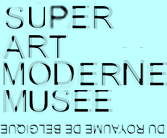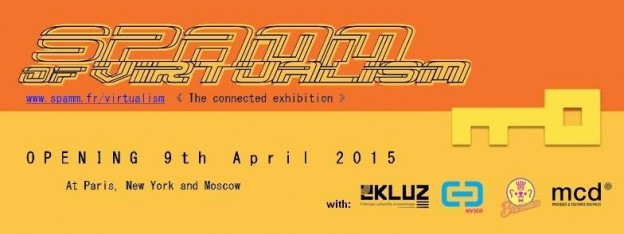Curated by Michaël Systaime Borras, founder of www.spamm.fr;
Helena Acosta, founder of Produccion Aleatoria
and Jean Guillaume Le Roux founder Virtualism
3 SPACES
Babycastles Gallery, New York
Opening 6pm
http://babycastles.com/
137 West 14th St, Manhattan, New York
EKLUZ, Paris
https://www.facebook.com/
13 rue des Ecluses Saint Martin, 75010, Paris
Electromuseum, Moscow
http://electromuseum.ru/
Rostokinskaya ul, 1, Moscow
” SPAMM of Virtualism “, Net Art exhibition offers to connect with a webcam interactive scenography these great capitals, Moscow, Paris and New York, around a digital creation on the Internet and the artistic movement of virtualism.
As Art is a source of communication, Art is a communication in itself, this exhibition is a symbol of unity around the sharing tool which is the Internet 2.0
[ D I S P O S I T I F ]
« The virtualism is an artistic movement that defines art forms designed with the help of digital tools. It interprets the notions of gestures and materials in the field of digital: the virtualist work is based on a creative act in power, reflected by the interfaces that reduce the action to simple actions, automated by peripheral tools. »
Encyclopedia, « 100 notions of digital art »
Editions de l’immateriel
The raw material of digital creations being virtual, the acted gesture of creation redefines the creative act in power. Indeed, what is virtual is inherently powerful and the creative gesture in this case has no tangible impact on the material being worked. The gesture in power is what is observable in the digital, the acted gesture on the interface. The virtualism is a reconsideration of the creative act and its plastic relationship to the material.
The virtualism in the post-industrial context
In the 1960s, in the heart of the industrial society, the consumption of goods is the major societal concern. Thus Yves Klein and Pierre Restany develop the new realism theory. By implementing the object of consumption as a subject in itself, this artistic movement is directly related to the context of industrial society. This approach will be extended by the creation of the current sociological art by Fred Forest and the relational art by Nicolas Bourriaud. Thus the history of art is in dialogue with the social context and it should be taken into account this context while writing new theories. The 1980s saw the birth of the concept of post-industrialism, an assumption that the raw material of industrial society would be replaced by a knowledge economy through an exponential growth of tertiary sectors. This theory, rediscovered in the 2000s, is particularly visible in the digitalwhere the information is dominant in a social system. It is in this movement that fits the virtualism, in a society where the digital is spreading in a daily life of virtual reality.
With:
- Kim Asendorf, Allemagne http://kimasendorf.com/
- Systaime aka Michael Borras, France http://www.systaime.com/
- Nick Briz, USA http://nickbriz.com/
- Anthony Antonellis, USA http://
www.anthonyantonellis.com/ - Helena Acosta, Venezuela http://
produccionaleatoria.com/ - Alfredo Salazar-Caro, USA http://salazarcaro.com/
- Antoine Schmitt, France http://
www.antoineschmitt.com/ bienvenue/ - Jacques Perconte, France http://
www.jacquesperconte.com/ - Tù.úk’z, Brésil http://
tuukz.glitchartistscollecti ve.com/ - Alan Schaffer, USA http://
www.alanschaffer.com/ - Miyo Van Stenis, France http://miyovanstenis.com/
- Maggy Almao & Antoine Marroncles, France http://maggyalmao.com/
- Lorna Mills, Canada http://
www.digitalmediatree.com/ sallymckay/ LornaMillsImageDump/ - La Turbo Avedon, USA http://turboavedon.com/
- CHIKA, USA http://www.imagima.com/
- Fred Forest, France http://www.fredforest.org/
- Elena Garnelo, Espagne http://
elenagarnelo65.tumblr.com/ - Dafna Ganani, Royaume Uni http://minimalcomfort.org/
- Sophie Lavaud, France http://
www.sophielavaud.org/ - Carole Brandon, France http://
www.carolebrandon.com/ - ZIL, Allemagne https://www.facebook.com/
vitaminZIL - Alix Desaubliaux, France http://alixdesaubliaux.fr/
- Marc Veyrat et Franck Soudan, France http://u-rss.eu/
- Rozita Fogelman, USA http://rozita.com/
- Philippe Boisnard et Arnaud Courcelle, France http://databaz.org/
xtrm-art/?page_id=312 - Claudia Maté, Royaume Uni http://claudiamate.com/
- Hugo Lemerchin, France http://
hugolermechin.tumblr.com/ - Igor Stromajer, France https://
intima.wordpress.com/ - Mathieu Delourme, France http://
www.matthieudelourme.net/ - Dimitry Morozov, Russie http://vtol.cc/
- Olga Kisseleva, France http://www.kisseleva.org/
- Rosemary Kirton, Royaume Uni http://
grossmary.tumblr.com/ - Sergei Teterin, Russie http://www.teterin.ru/
- Aristarkh Chernyshev, Russie http://
www.electroboutique.com/ artists/0 - Jean Guillaume Le Roux, France https://www.facebook.com/
Jeanguillaumeleroux.artiste - Elena Romenkova, Russie http://
elena-romenkova.blogspot.ru / - Javierz Yeikob, Chili https://www.facebook.com/
Y31k08 - Adela Muntean, Italie http://
www.adelamuntean.com/ - Eva Papamargariti, Greece/UK http://
evapapamargariti.tumblr.com / - Max Paskine, France http://paskine.com/
- Erik H Zepka, Canada http://x-o-x-o-x.com/
- Randall Packer, USA http://zakros.com/packer/
- Kamilia Kard, Italie http://
kamiliakard.tumblr.com/ - Alex Atipin, Russie https://www.behance.net/
mega_sbjct - Mert Keskin a.k.a Haydiroket, Turquie http://www.haydiroket.com/
- David Quiles Guilló,spain http://rojoprojects.co/
- Jon Cates, USA http://
systemsapproach.net/
facebook event : https://www.facebook.com/events/728747110577541



